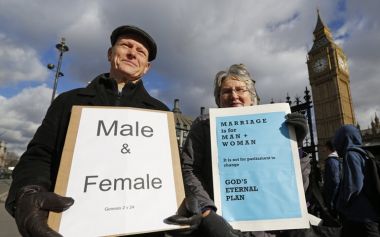Christian belief that Jesus is Son of God could be outlawed in UK, warns top theologian

Professing basic Christian beliefs such as Jesus being the Son of God could become a criminal offence in Britain if Prime Minister David Cameron succeeds in pushing through with his plan to issue banning orders to curb extremism, a top Anglican theologian has warned.
The Rev Dr. Mike Ovey, a former lawyer and current principal of Oak Hill Theological College in London, has raised serious doubts on Cameron's reported plan to impose a ban on groups that encourage people to be radical, which the government believes contributes to the weakening of "British values."
The plan came to light following the recent arrests of Christian street preachers by police after some people complained that their traditionalist teachings were homophobic, The Telegraph reported on Monday.
The plan reportedly forms part of the government's counter-extremism measure.
"For too long, we have been a passively tolerant society, saying to our citizens: as long as you obey the law, we will leave you alone. It's often meant we have stood neutral between different values. And that's helped foster a narrative of extremism and grievance," Cameron said in a statement.
"What we are proposing is a bill which will have certain measures within it, measures such as introducing banning orders for groups and disruption orders for individuals, for those who are out there actively trying to promote this hatred and intolerance which can lead to division in our society and undermines our British values," British Home Secretary Theresa May explained.
Extremism is the "vocal or active opposition to fundamental British values including democracy, the rule of law, individual liberty and mutual respect and tolerance of different faiths and beliefs," according to the Home Office.
It is this broad definition, however, that is problematic, according to Dr. Ovey. He emphasised that until the criteria are clearly drawn, the orders can be employed as a weapon against nearly anyone. It can have a "chilling effect" on preachers and be used to challenge schools' educational programs, he warned.
Dr. Ovey said even the belief that Jesus is the Son of God can be considered offensive to other religions and therefore be against British values.
Conventional Christian teachings about abortion could also be considered as possible grounds for action that could spur violence.
The theologian explained that the definition has a "string of values" that "sometimes conflict."
"So I may argue that when I advocate the uniqueness of Christ, I should be exempt from some public order legislation in order to protect my freedom of expression. But the majority may disagree," he wrote in the Oak Hill College's blog.
"Have I been in vocal opposition to 'democracy'? On one view, yes. Has the majority been advocating the suppression of 'individual liberty'? On one view, yes. The list of 'British values' is not only inclusive rather than exhaustive, it contains internal conflict," he added.
Dr. Ovey was a former civil service lawyer drafting state legislation before joining Oak Hill in 1998.
Extremism disruption orders are designed to give police the powers to ask the high court for an order to put a cap on "harmful activities" of extremists, in order to arrest not only those who promote hatred in terms of gender, race, or religion, but those who hold harmful activities for the "purpose of overthrowing democracy" as well, The Guardian reported.
The measures will require people to clear with the police in advance any publication online or in print.
The counter-terrorism bill will also allow premises where extremists can influence people to be closed down, including mosques.
It will further strengthen the powers of the Charity Commission to axe charities that bankroll terrorism and extremism.











